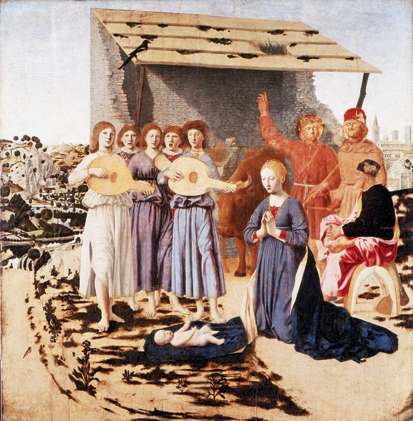The most celebrated Christmas carol, ‘Silent Night’, belongs to Austria. Father Joseph Mohr, the priest at Oberndorf, a small village near Salzburg, wrote it in 1818. Set to music by Franz Xaver Gruber, it was sung on Christmas Eve at the church of St Nicholas: Stille Nacht, heilige Nacht. It is the most celebrated carol for it captures the stillness of a winter night, the wonder of Christ’s birth, and the hope of all mankind for peace.
But when it comes to the celebration of that birth nothing surpasses the English tradition. On Christmas Eve millions of people all over the world will tune in not to Oberndorf but to King’s College, Cambridge, where the choristers take us, as they have since 1918, through the Festival of Nine Lessons and Carols. For many of those watching on television, and listening on the radio, it will be the highlight of the season.
The splendour of carols lies mainly in the beautiful music. Only mainly, though. Johann Sebastian Bach composed the greatest choral music, but it is not Bach we sing at Christmas. Choirs perform his Christmas Oratorio, certainly, but it is carols that people like to hear. Here is the music of innocence, which brings out the child in us all. In a handful of verses, often sentimental, sometimes a bit slushy, we are transported back to childhood, away from the commercial distractions of a secular world.
Old-fashioned words assist this transformation. The liturgy of the Anglican Church has been altered so much by the unnecessary process of modernisation that the prayers and responses, as well as many of the hymns, have become a trap for the unwary. Carols belong to the old dispensation, and we are the better for it. Who cannot respond to ‘the first Noel the angels did sing’? Or the poor man who came in sight of good king Wenceslas ‘gathering winter fu-u-el’? Give ’em time, and they’ll probably change that to ‘heating allowance’. It won’t sound quite the same.
The doors are not closed to those who want to maintain the tradition. Last year the King’s choristers sang ‘All Bells in Paradise’ by John Rutter, a touching carol that sounded as though it had always been there. All praise to Rutter, and to King’s, for issuing the invitation that added another layer to the famous ceremony.
Besides, where tradition is concerned, carols are a moveable feast. There is, obviously, a Christian representation of Christmas, yet the festival also has pagan roots. Much of the imagery of Christmas, the pine trees, the holly and the ivy, the ‘wish you a merry Christmas’ jollity, belongs in the nether land between the two traditions, so that people who have no faith can join in.
We all have our favourites: ‘In The Bleak Midwinter’, with its poem by Christina Rossetti set to music by Gustav Holst; ‘Hark! The Herald Angels Sing’, a collaboration between Charles Wesley and Felix Medndelssohn that bridges the 18th and 19th centuries, and also England and Germany; ‘In Dulci Jubilo’, mixing Latin with English. There are even some folk, one hears, who enjoy ‘While Shepherds Watched Their Flocks By Night’.
In the manner of Dean Swift, I offer a modest proposal. The most beautiful carol, to these ears, written anonymously, was enthroned in splendour by R.R. Terry, Sir Richard Runciman Terry, the director of music at Westminster Cathedral in the first two decades of the last century. ‘Lullay Myn Lyking’ does not always get an airing at King’s, for it is not one of the ‘greatest hits’. Yet, in its pureness and spareness, it is more affecting than many of the better-known carols that people know by heart.
Holst supplied a musical setting of this carol, which tells of Mary’s address to the Christ-child. So did Peter Warlock and, more recently, Sir David Willcocks and Sir Richard Rodney Bennett. But it is Terry’s haunting setting that takes the palm. He was versed in the music of Tallis and Byrd, and in this carol he wrote something glorious.
This beautiful setting has also enjoyed a notable second life. Michael Powell used the carol in his 1947 film Black Narcissus, set in a convent in the Himalayas. Sister Clodagh, played by Deborah Kerr, relives a happy moment from her youth in Ireland, and the carol comes back to her as an aide-memoire of the man she once loved.
It is a long way from the old carole (French for ‘circle dance’) used in medieval mystery plays, through Byrd’s Christmas motets, to Rutter’s paradisal bells. Yet it seems we cannot hear enough of these beautiful festival songs. Oh, the wonder of it! On Christmas Eve, a boy treble will step out of the choir at King’s College, chosen to sing those five simple words that take us back to childhood: ‘Once in Royal David’s City’. Christmas will have begun.






Comments